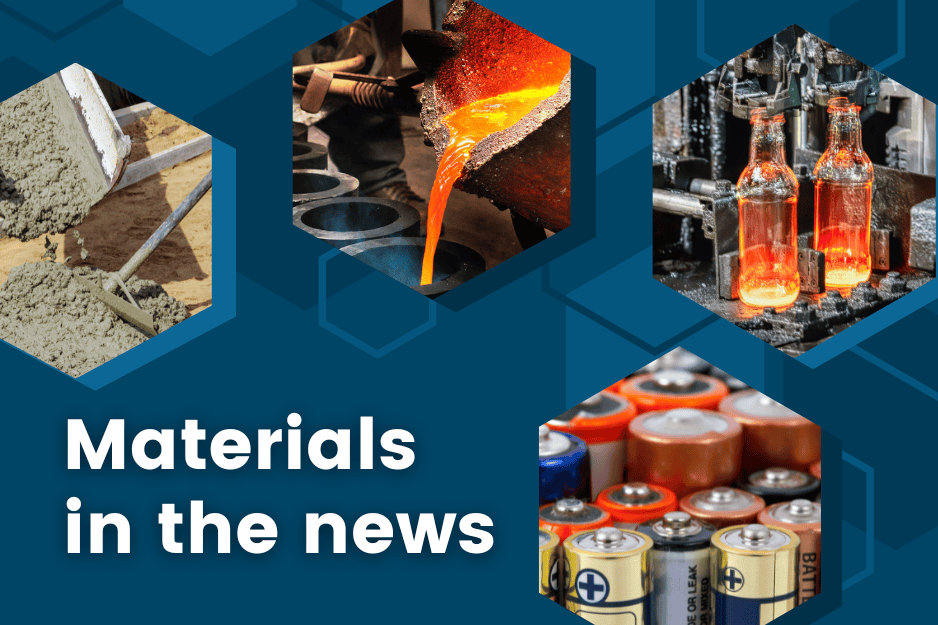
[Images above] Credit: NIST
NANOMATERIALS
An improved wearable, stretchable gas sensor using nanocomposites
Researchers at The Pennsylvania State University, Northeastern University, and five universities in China developed and tested a stretchable, wearable gas sensor for environmental sensing. The sensor combines a laser-induced graphene foam material with a unique form of molybdenum disulfide and reduced-graphene oxide nanocomposites.
ENERGY
New insights into ‘nickel-rich’ lithium-ion battery failure mechanism
Researchers from the Universities of Cambridge and Liverpool, and the Diamond Light Source, found after prolonged use, the atoms at the surface of “nickel-rich” battery materials rearranged to form new structures that pin the rest of the material in place and prevent it from the contraction, which is required to reach the fully charged state.
Dual aluminum-nitrogen battery that stores energy and fixes nitrogen
Researchers developed an innovative rechargeable aluminum-nitrogen battery that also functions as a nitrogen fixation device by producing an aqueous NH3 solution from the electrochemically generated aluminum nitride.
New dopants may improve PV glass performance
Scientists from the RISE Research Institutes of Sweden and the U.K.’s Sheffield Hallam University investigated how doping glass in photovoltaic modules can help it absorb harmful UV photons while also re‐emitting some of this absorbed energy as photons of visible light that then can be captured and converted by the solar cell.
BIOMATERIALS
ADASRI staff develop new technique for testing fracture toughness of zirconia
Researchers from the American Dental Association Science & Research Institute, in collaboration with Argonne National Laboratory, developed a new way to create sharp, nanometer-sized notches necessary for measuring the fracture toughness of zirconia materials used in dental restorations.
Standing on the outside looking in: X-rays through glass
In a PhysicsWorld article, a medical physicist at a large public trauma hospital in Melbourne, Australia, describes their experience with taking chest X-rays through glass to conserve personal protective equipment, reduce radiographer risk, and speed up the process.
ENVIRONMENT
Scientists use fruit peel to turn old batteries into new
Scientists led by Nanyang Technological University, Singapore developed a novel method of using fruit peel waste to extract and reuse precious metals from spent lithium-ion batteries in order to create new batteries.
Are radioactive diamond batteries a cure for nuclear waste?
University of Bristol researchers are developing nuclear batteries based on diamonds. They grow artificial carbon-14 diamonds and then infuse them directly into a vanilla lab-grown diamond. The result is crystal diamond with a seamless structure, which minimizes distance beta particles travel and maximizes efficiency of the nuclear battery.
Recaptured heat from O-I Glass plant heats French homes
Homes in a Reims, France, neighborhood are being heated in part by recaptured heat from the nearby Owens-Illinois Glass manufacturing plant. O-I Glass and the France-based energy solution company Dalkia built the heat recovery network together.
MANUFACTURING
New nitrogen assembly carbon catalyst has potential to transform chemical manufacturing
Ames Laboratory researchers discovered that how nitrogen was distributed on the surface of nitrogen-assembly carbons really mattered, and in the process realized it indicated an entirely new kind of chemical activity.
OTHER STORIES
TRI academic scholarships for full-time students
The Refractories Institute provides academic scholarships to full-time students who have expressed interest in refractory manufacturing through their coursework or related activities. Scholarships consist of one-time grants of $5,000 per student. The application deadline is October 1. Successful applicants will be notified and awarded in November.
Storing information in antiferromagnetic materials
Researchers at Johannes Gutenberg University of Mainz showed information storage in antiferromagnetic materials is fundamentally possible and also how to measure the efficiency at which information is written electrically in insulating antiferromagnetic materials. For their measurements, they used the antiferromagnetic insulator cobalt oxide.
Microscopic robots ‘walk’ thanks to laser tech
A Cornell University-led collaboration created the first microscopic robots that incorporate semiconductor components, allowing them to be controlled—and made to walk—with standard electronic signals.
Teamwork makes the 5G dream work: A collaborative system architecture for 5G networks
Researchers led by Daegu Gyeongbuk Institute of Science and Technology designed a novel system architecture in which collaboration between cloud service providers and mobile network operators plays a central role. Such a collaborative architecture would allow for optimizing the use of network, computing, and storage resources.
New electronic skin can react to pain like human skin
Researchers at RMIT University developed electronic artificial skin that reacts to pain just like real skin, opening the way to better prosthetics, smarter robotics, and noninvasive alternatives to skin grafts. They also developed devices using stretchable electronics that can sense and respond to changes in temperature and pressure.
Astronomers suggest strategies to reduce interference from satellite megaconstellations
A new report by the American Astronomical Society and National Science Foundation’s NOIRLab warns large constellations of low Earth orbit satellites “threaten the scientific viability” of ground-based optical observatories. It recommends various strategies to reduce light pollution impact, but it finds no combination of actions will fully eliminate the problem.
Author
Lisa McDonald
CTT Categories
- Weekly Column: “Other materials”
